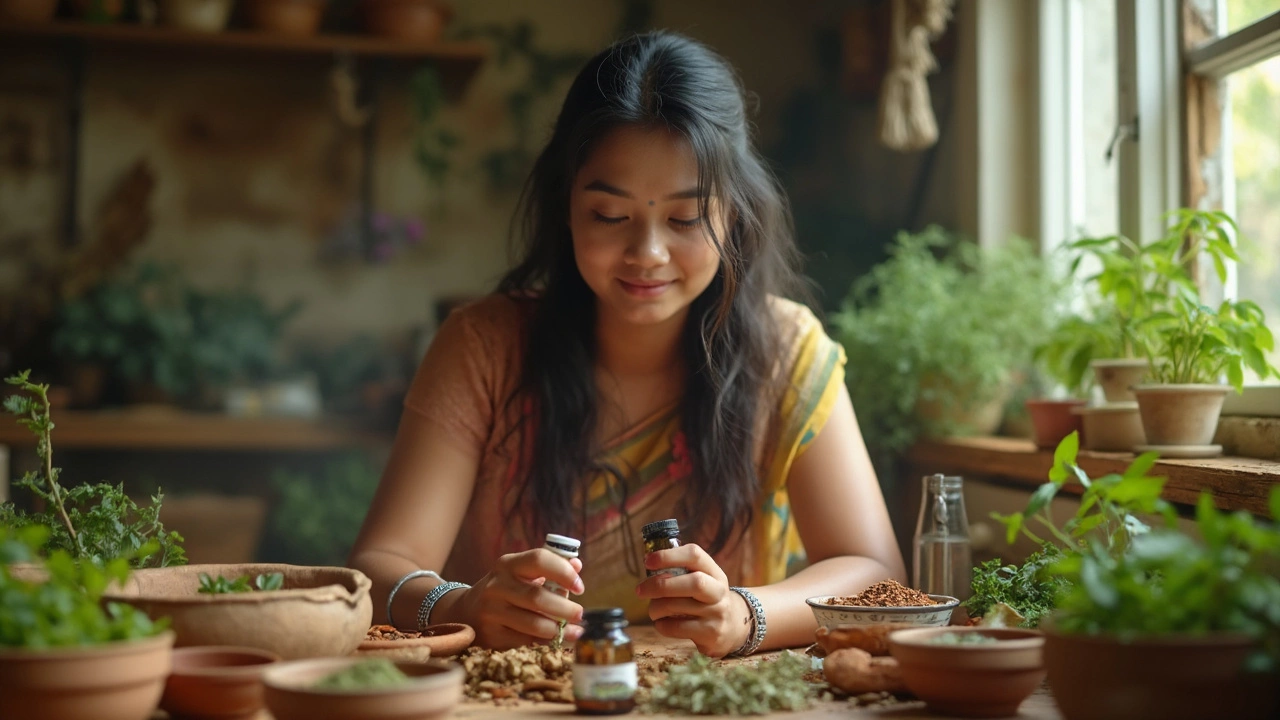Pop into any health store, and you’ll find shelves loaded with herbs promising to calm your nerves or boost your focus. But did you know some of these “natural” remedies can do the exact opposite—leaving you edgy, restless, or flat-out anxious?
It’s surprising, right? We’re all told that herbs are gentle and safe—a far cry from the side effects you might get from prescription meds. But the truth is, plants have powerful effects of their own. Some can trigger anxiety even in folks who’ve never struggled with it before. And if you’re someone already prone to feeling on edge, certain herbs could crank things up a notch when you least expect it.
Want to keep your herbal routine chill instead of chaotic? You need to know which herbs are most likely to stir up trouble and what puts you at higher risk. Awareness is key, especially if you already lean on herbal teas, tablets, or tinctures for sleep, stress, or energy. Let’s take a closer look at which herbs could leave you feeling less Zen and more on edge—so you can choose what’s actually right for you.
- The Hidden Link Between Herbs and Anxiety
- Common Herbs That May Trigger Anxiety
- Why Do These Herbs Affect Our Mood?
- Who’s Most at Risk?
- Smart Tips for Safe Herbal Use
- When to Seek Medical Help
The Hidden Link Between Herbs and Anxiety
Most people think of herbal supplements as calm in a cup. But here’s the kicker: some herbs can actually send your anxiety levels spiking, and it’s backed up by years of real-world cases and studies. Not every plant is as harmless as it sounds on the label.
How does this happen? Herbs work by messing with the same systems in your body as medications do—think brain chemicals (like serotonin and dopamine) that control your mood. Some herbs have compounds that either pump these chemicals up too much or throw your nervous system off balance. That creates a snowball effect, leading to sweaty palms, racing thoughts, or a pounding heart. Pretty much the stuff you’re trying to avoid if you’ve ever dealt with anxiety.
Here’s an eye-opener: in a 2022 survey of herbal supplement users in the US, about 1 in 10 reported unexpected side effects, including feeling more anxious. That’s not a tiny number. And because herbs can mix together in teas and blends, lots of folks don’t even realize what’s setting them off.
| Herb | Reported Anxiety Side Effects |
|---|---|
| Ginseng | Common (especially with high doses) |
| Yohimbe | Frequent |
| Guarana | Moderate to high |
| St. John’s Wort | Occasional, especially when combined with other meds |
The big takeaway? “Natural” doesn’t mean “harmless” for your nerves. If you find yourself more wired than usual after starting a new herb, it might not be your imagination.
Common Herbs That May Trigger Anxiety
You'd think all herbal supplements are about bringing calm, but that's not the whole story. Some herbs have a sneaky side, especially if you’re sensitive or take them in high doses.
- Caffeine-containing herbs – Guarana and yerba mate aren’t just found in energy drinks. Both are packed with natural caffeine, which can leave you jittery or even fuel anxiety if you’re already on edge.
- Ginseng – People love this energizer for focus and stamina, but ginseng has been linked to nervousness, insomnia, and a fast heartbeat in some folks.
- St. John’s Wort – It’s well-known for mood boosts, but it can also cause agitation and anxiety when mixed with certain medications or if you’re sensitive to shifts in brain chemicals.
- Ephedra (Ma Huang) – Banned in many countries for good reason, ephedra is a stimulant that can seriously raise anxiety, blood pressure, and even cause heart issues. Still, it sometimes turns up in weight loss or performance products bought online.
- Yohimbe – Used for energy or performance, yohimbe can trigger restlessness, rapid heartbeat, and panic attacks, especially if combined with other stimulants.
- Rhodiola – People use it to handle stress, but in higher doses or if you’re sensitive, it might have the opposite effect and worsen anxiety symptoms.
If you want some quick facts to keep things practical, check out this handy table showing which herbs pack the biggest punch when it comes to potential anxiety issues:
| Herb | Main Risk | Common in |
|---|---|---|
| Guarana | Jitters, rapid heartbeat | Energy drinks, diet supplements |
| Ginseng | Nervousness, trouble sleeping | Capsules, teas |
| St. John’s Wort | Agitation, anxiety (esp. with meds) | Mood supplements |
| Ephedra | Severe anxiety, heart problems | Some online supplements |
| Yohimbe | Panic attacks, rapid pulse | Sexual performance pills |
| Rhodiola | Restlessness, anxiety (high doses) | Stress adaptogen blends |
The reality is, even “natural” herbs like these need respect. If you ever notice your heart racing or your mind spinning after using a herbal supplement, it might be time to check the label. Sometimes the cause isn’t stress, but what’s in your daily health routine.
Why Do These Herbs Affect Our Mood?
It’s wild to think a cup of so-called relaxing tea or a capsule from a wellness aisle can flip your mood upside down. But that’s exactly what happens for some people. The basic reason? Certain herbs mess with the same brain chemicals that power your feelings, focus, and even anxiety levels.
Some common mood movers these herbs can tweak include:
- Serotonin – This is often called the “feel good” chemical. Too much or too little can mess with your head, causing either chill vibes or serious jitters.
- Norepinephrine – This one controls alertness and stress. When herbs spike this chemical, it can put you on edge or make your heart race.
- GABA – It helps calm brain activity. Some herbs that act on GABA might sound relaxing at first, but they can actually backfire and cause anxiety for certain folks.
The way your body handles herbal supplements is another big factor. Some people break down plant compounds quickly, while others hang on to them longer. Genetics, your age, what meds you take, and even the food you eat can shift how strong an herb hits your system. That’s why one person feels relaxed after valerian root, while another can’t sleep and feels wired.
Check out this quick snapshot of how some top herbs interact with mood-linked brain chemicals:
| Herb | Main Brain Chemical Affected | Possible Mood Effect |
|---|---|---|
| St. John’s Wort | Serotonin | Nervousness, anxiety, trouble sleeping |
| Ginseng | Norepinephrine | Restlessness, fast heartbeat |
| Yohimbe | Norepinephrine | Panic-like symptoms |
| Kava | GABA | Sometimes too calming, can rebound into anxiety |
It’s all about how these plants plug into your brain’s wiring. Even a small daily habit, like drinking a certain herbal tea, can tip the balance if your body is sensitive. So, if you’re feeling more edgy than usual after starting a new supplement, don’t just brush it off—your mood could be telling you something about that herb.

Who’s Most at Risk?
Not everyone sipping on herbal supplements needs to be on high alert, but there are specific groups who should watch out for anxiety as a possible side effect. Personal health, genes, and even what meds you take all play a role in how you react.
If you already struggle with anxiety or panic attacks, your nervous system is a bit like a hair-trigger alarm—herbs that overstimulate can make things way worse. Anyone with a diagnosed anxiety disorder or a history of mental health issues should be extra cautious and maybe talk to their doctor before trying new herbs.
- People with anxiety, depression, or bipolar disorder: Certain herbs known for their stimulating effects—like ginseng or guarana—can make symptoms worse or less predictable.
- Folks taking other medications: Adding herbal remedies can mix badly with antidepressants, anti-anxiety meds, or stimulants. This can boost side effects, sometimes leading to jitteriness or nervousness.
- Younger adults and teens: Their bodies can be hypersensitive to ingredients in herbal supplements.
- Caffeine-sensitive people: If coffee makes your leg shake, beware: several herbs act a lot like caffeine in the body.
- Those with thyroid issues: Certain herbs can speed up heart rate or metabolism, which can feel a lot like anxiety—especially if your thyroid is already out of whack.
It’s not just about your own health history. Genetics can make some people metabolize active compounds in herbs way faster (or slower) than normal, which changes how strong the side effects feel. Plus, there’s your dose—some folks go from chill to wired with just a small cup of herbal tea, while others can sip bigger amounts with no trouble.
| Group | Why Extra Risk? |
|---|---|
| People with anxiety | Heightened sensitivity to stimulants |
| Antidepressant users | Poor interactions raise anxiety |
| Caffeine-sensitive | Likely to feel jittery faster |
| Teenagers | Higher body sensitivity |
| Thyroid patients | Herbs can mimic thyroid symptoms |
Bottom line: If you’re in any of these groups, herbs with stimulant effects aren’t always your friend. Double-check labels and err on the side of less rather than more. When in doubt, a quick chat with your doctor can save you a ton of stress—literally.
Smart Tips for Safe Herbal Use
Going natural sounds good until a herb amps up your anxiety. You don’t have to ditch all herbal supplements, but you do need a strategy for staying safe—and chill.
- Research every herb before use: Don’t just trust the front label. Look up trusted sources to see if that herb is linked to anxiety or jittery side effects. Kava, ginseng, and even caffeine-heavy green teas can trigger uneasiness in some folks.
- Start slow and small: The first time you try a new herb, take the lowest possible dose. See how your body responds over a few days before increasing the amount.
- Don’t mix too many at once: Combining several herbs can make it hard to tell what’s causing a bad reaction. Stick with one new remedy at a time, especially if you’re trying to spot any side effects or extra anxiety.
- Check for interactions: Herbal supplements can mess with medications, including antidepressants and blood pressure meds. Ask your doctor or pharmacist if you’re unsure.
- Watch for symptoms and track them: Keep a simple diary. Jot down how much you’ve taken and how you feel each day. This makes it easier to spot a pattern if you start feeling more anxious or jittery.
- Buy from reputable sources: Cheap online supplements sometimes contain surprise ingredients or contaminants. Always pick a brand that gets tested for quality and safety.
- Check your caffeine intake: Some “herbal” teas really pack a punch. Yerba mate, guarana, or certain green tea blends can be just as wired as a shot of espresso.
- Talk to your healthcare provider: It might feel awkward, but it saves you grief if you already have a history of anxiety or other health concerns.
If you want a quick snapshot of herbs most commonly tied to anxiety or jumpiness, here's a handy table:
| Herb | Known Effect |
|---|---|
| Ginseng | May cause nervousness, insomnia |
| Yohimbine (from yohimbe bark) | Linked to rapid heartbeat, anxiety |
| Guarana | High caffeine, can trigger restlessness |
| Green Tea Extract | Caffeine content can raise anxiety |
| Ephedra (now banned in many countries) | Strong stimulant, once linked to severe anxiety |
When in doubt, remember that supplements can be just as potent as prescriptions. Tuning in to your body, asking questions, and keeping track of changes puts you in control—so your natural remedy doesn’t leave you regretting it.
When to Seek Medical Help
It’s easy to shrug off a little jitter or racing heart after trying a new herbal supplement. But sometimes what seems like a small side effect can quickly spiral. If your anxiety starts messing with your daily life, don’t just assume it’s normal or harmless. Here’s when you really shouldn’t just wait it out.
- Panic attacks: If you suddenly feel like you can’t breathe, your chest is tight, or you’re sure something terrible is happening, that’s not just regular stress.
- Persistent insomnia: When one sleepless night turns into a week or more, it’s time to look at what you’re taking and chat with a doctor.
- Physical symptoms that won’t quit: Fast heartbeat, shaking, sweating, or stomach pain that shows up after starting a new herb? Don’t ignore it if it keeps happening.
- Worsening mental health: If you feel way more anxious or even depressed since starting a herb, that’s a big red flag. Stop taking it and check with a professional.
- Mixing with medications: Some herbs play badly with things like antidepressants, anxiety meds, or even blood pressure pills. Always double check if you’re combining things.
In an emergency, like if you have chest pain, severe trouble breathing, or sudden confusion, don’t wait it out—get medical help immediately.
Doctors and pharmacists actually see a lot of cases where "natural" products cause problems. According to a 2023 study published in the Journal of Clinical Psychopharmacology, nearly 16% of reported cases of new-onset anxiety or panic in adults had some link to a recently started herbal supplement. Most people had no idea the two could even be connected.
| Warning Sign | Possible Cause |
|---|---|
| Fast heartbeat | Stimulant herb (like guarana) |
| Insomnia | Ginseng or yerba mate |
| Worsening anxiety | Valerian, St. John’s Wort, or kava |
| Mood swings | Herbal-SSRI mix (like St. John’s Wort plus antidepressants) |
If you’re ever unsure, it’s better to call a healthcare provider and get checked. Your peace of mind—and your daily calm—are worth it.



